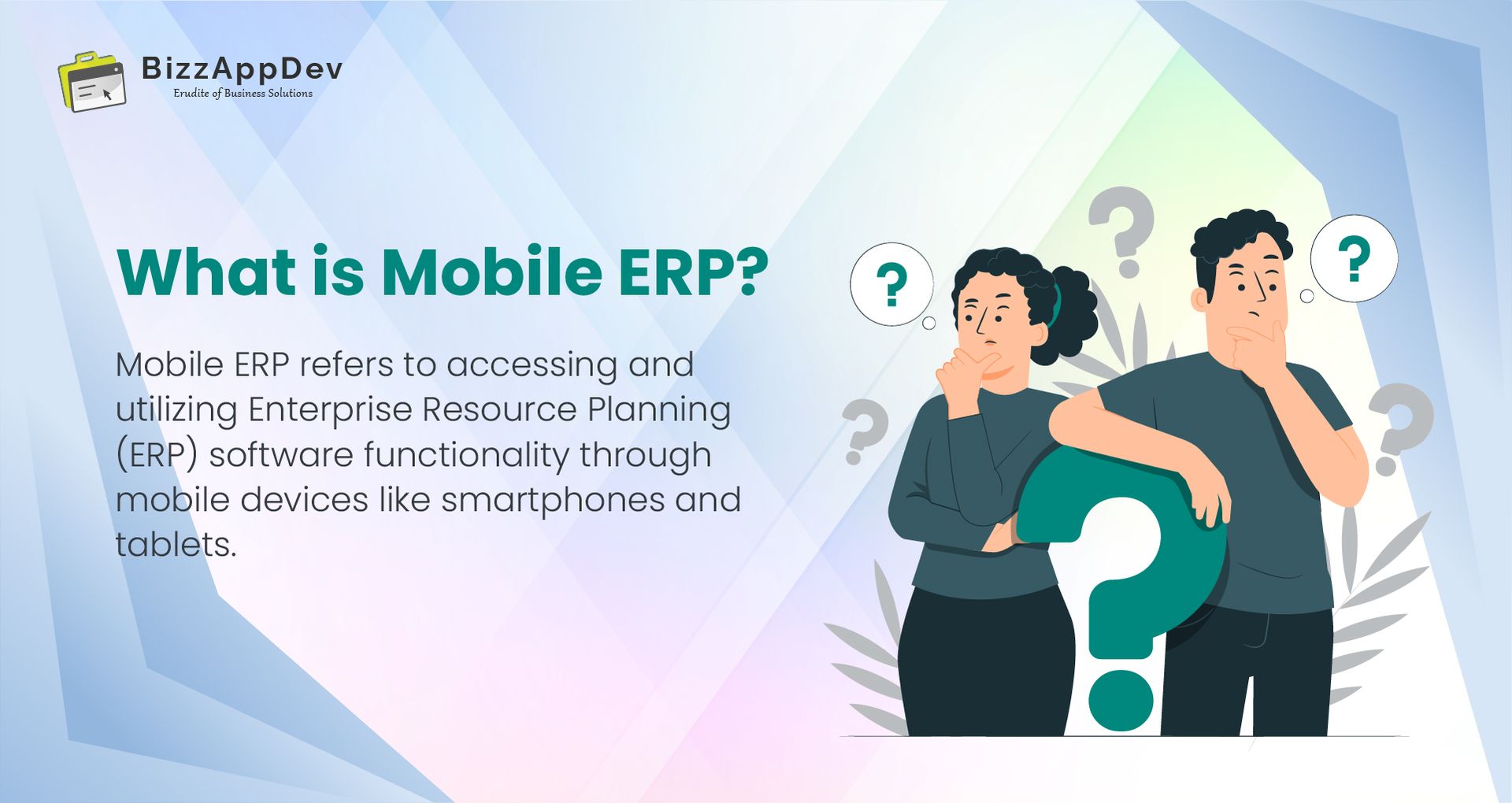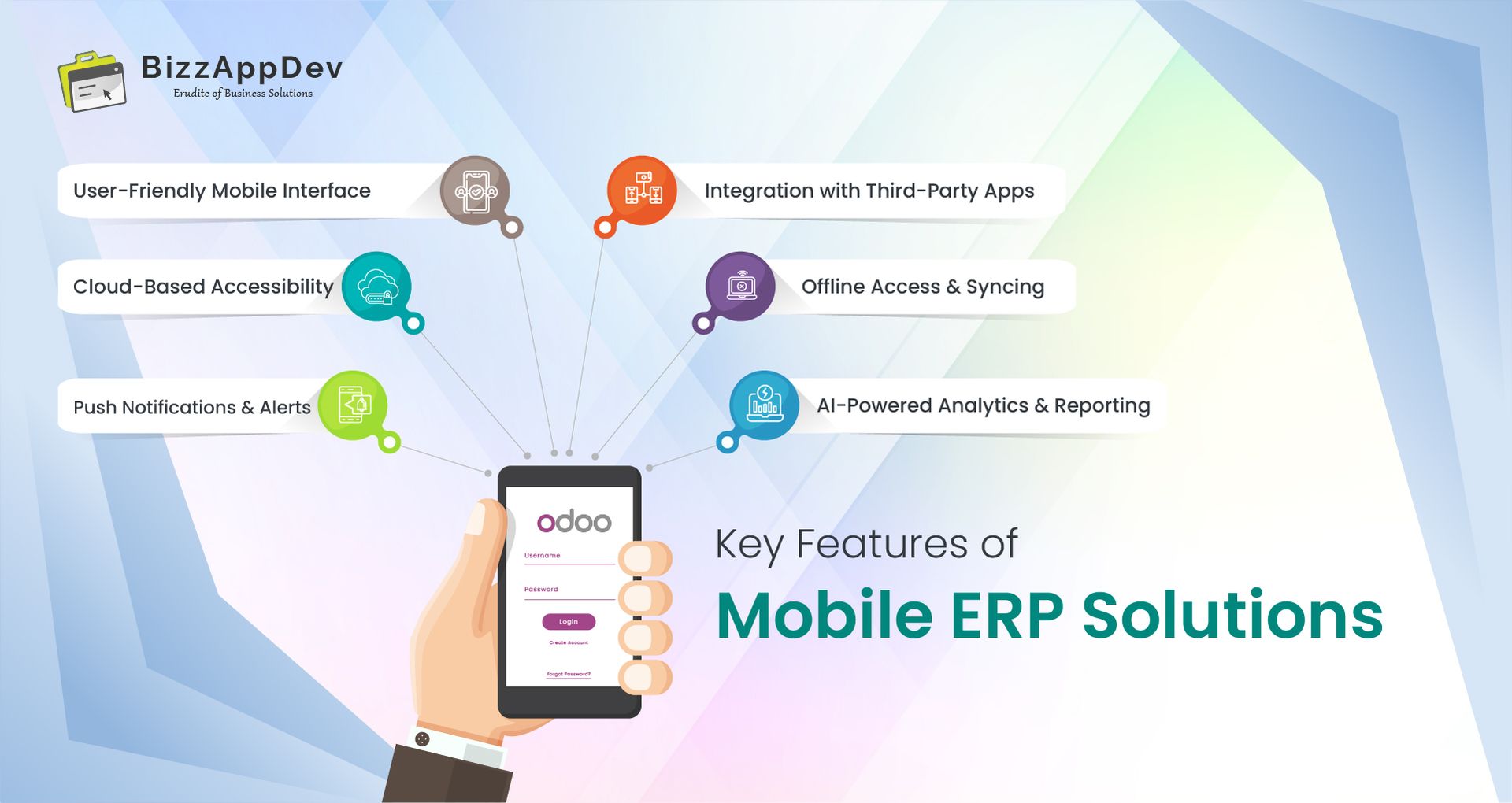In today’s fast-paced business environment, agility and accessibility are no longer optional—they’re essential. The increasing reliance on mobile technology has led to the rise of Mobile ERP (Enterprise Resource Planning) solutions, enabling businesses to stay connected, make informed decisions, and enhance productivity on the go.
With smartphones and tablets becoming integral tools in the workplace, Mobile ERP solutions are revolutionizing how companies manage operations. But what exactly is Mobile ERP, and why is it gaining traction? This blog explores its benefits, key features, and why businesses should consider making the shift, especially with Odoo’s advanced mobile ERP capabilities.
What is Mobile ERP?

Mobile ERP refers to ERP systems accessible via mobile devices like smartphones and tablets. Unlike traditional ERP, which is primarily designed for desktops, Mobile ERP provides real-time access to crucial business data from anywhere, enabling managers and employees to perform tasks without being tied to their office computers.
By leveraging cloud technology, Mobile ERP systems offer a seamless and secure way to manage finances, inventory, sales, human resources, and other core business processes from a mobile interface. Odoo ERP takes this a step further, offering a powerful mobile application that allows businesses to operate with enhanced flexibility and control.
Benefits of Mobile ERP Solutions
1. Enhanced Accessibility & Remote Work Capabilities
One of the biggest advantages of Mobile ERP is the ability to access business data anytime, anywhere. Whether you’re in a meeting, traveling, or working remotely, having real-time access to ERP systems ensures uninterrupted workflows and quick decision-making.
How it helps:
Sales teams can update customer records and check inventory levels on the go.
Managers can approve purchase orders and monitor business KPIs in real time.
Field service employees can log job details and access schedules instantly.
2. Increased Productivity & Efficiency
Mobile ERP eliminates the need for employees to return to their desks for data entry or approvals. By streamlining workflows and reducing redundant tasks, businesses can operate more efficiently.
How it helps:
Automated notifications for approvals, tasks, and reports.
Reduced paperwork and manual data entry.
Faster response times to business needs and customer inquiries.
3. Real-Time Data & Decision-Making
Traditional ERP systems may cause delays in reporting and analytics. Mobile ERP, on the other hand, provides real-time insights into financials, inventory, HR, and sales, allowing businesses to act on data instantly.
How it helps:
Executives can monitor company performance from anywhere.
Inventory managers can track stock levels in real time.
HR teams can approve leave requests and update payroll remotely.
4. Seamless Collaboration Across Departments
A mobile-connected workforce ensures that employees from different departments remain in sync. Whether it's sales, finance, or HR, teams can collaborate effectively using a centralized system.
How it helps:
Improved communication between sales and inventory teams.
HR can manage employee records and recruitment remotely.
Finance teams can track expenses and manage budgets on the move.
5. Cost Savings & Scalability
Mobile ERP reduces the dependency on physical infrastructure, leading to significant cost savings. Additionally, cloud-based ERP solutions offer scalability, allowing businesses to add new users and functionalities as they grow.
How it helps:
Lower IT maintenance and infrastructure costs.
Scalable solutions that grow with your business.
Subscription-based pricing models reduce capital investment.
6. Enhanced Security & Compliance
Many businesses worry about data security when adopting mobile solutions. However, modern Mobile ERP platforms come with robust security measures like encryption, multi-factor authentication, and role-based access control.
How it helps:
Data encryption ensures secure transactions.
Regular cloud backups prevent data loss.
Compliance with industry regulations like GDPR and HIPAA.
7. Improved Customer Service & Sales Management
With Mobile ERP, sales representatives can access customer histories, manage leads, and track sales pipelines in real time. This enables faster responses, better customer service, and higher conversion rates.
How it helps:
Real-time order tracking and status updates.
On-the-spot invoice generation and payment processing.
Quick access to customer information for personalized service.
Key Features of Mobile ERP Solutions
Mobile ERP solutions are designed to enhance efficiency, improve decision-making, and streamline business operations. Here’s a detailed look at some essential features and how they benefit businesses:

1. User-Friendly Mobile Interface
A well-designed mobile ERP system ensures that users can easily access and navigate critical business functions. It includes:
Intuitive Dashboards: A clear, visually appealing interface that presents real-time business insights at a glance.
Touchscreen-Optimized Controls: Mobile-optimized interactions, such as drag-and-drop and tap-friendly buttons, enhance user experience.
Customizable Views: Different roles (e.g., HR, Finance, Sales) can have personalized dashboards, ensuring quick access to relevant information.
2. Cloud-Based Accessibility
The integration of cloud technology with ERP systems ensures that businesses can operate without geographical constraints. Benefits include:
Secure Data Storage and Backup: All critical business data is stored safely in the cloud with automated backups.
Seamless Integration: Mobile ERP solutions sync effortlessly with cloud applications such as CRM, accounting, and inventory management.
Scalability: Businesses can scale up or down based on needs, ensuring long-term flexibility and cost-effectiveness.
3. Push Notifications & Alerts
Real-time updates and automated reminders improve responsiveness and task management. Features include:
Instant Alerts: Approvals, pending tasks, and important updates are sent directly to mobile devices.
Reminders for Business Activities: Never miss key deadlines, meetings, or workflow approvals.
Automated Reporting: Generate and receive scheduled reports without manual intervention.
4. Integration with Third-Party Apps
Mobile ERP solutions work seamlessly with various third-party applications to expand functionality. Key integrations include:
CRM & Accounting: Helps businesses track customer interactions and financial data efficiently.
eCommerce Platforms: API connectivity enables smooth online order processing and inventory updates.
Productivity Tools: Sync with Google Workspace, Microsoft Office 365, and project management software for better collaboration.
5. Offline Access & Syncing
A reliable mobile ERP system ensures uninterrupted workflows, even in areas with limited connectivity. Key features:
Work Without Internet: Employees can access and input data offline, ensuring productivity isn’t disrupted.
Automatic Syncing: Once internet connectivity is restored, all offline data is automatically updated to the cloud.
Seamless Workflow Continuity: Ideal for industries like logistics, construction, and field services where connectivity issues are common.
6. AI-Powered Analytics & Reporting
Data-driven insights help businesses make smarter decisions. Mobile ERP solutions provide:
Real-Time Business Intelligence Dashboards: Instantly track performance metrics and KPIs.
Predictive Analytics: AI-driven forecasting enables better inventory management, financial planning, and demand prediction.
Customizable Reports: Tailor reports to meet specific business needs and compliance requirements.
Industries Benefiting from Mobile ERP
Mobile ERP solutions have revolutionized various industries by offering real-time access to critical business processes. Here’s how different sectors leverage mobile ERP for better efficiency and growth:
1. Retail & eCommerce
Real-Time Inventory Tracking: Ensures optimal stock levels, preventing overstocking or stockouts.
Mobile POS (Point of Sale) Systems: Speed up transactions and improve customer experience in stores.
Personalized Marketing: Analyze customer behavior to deliver targeted promotions and loyalty programs.
2. Manufacturing
Production Monitoring: Supervisors can track production schedules and workflows remotely.
Supply Chain Management: Coordinate vendor relationships, procurement, and logistics efficiently.
Real-Time Quality Control Checks: Ensure compliance with quality standards using mobile devices on the factory floor.
3. Healthcare
Secure Patient Records: Doctors and medical staff can securely access patient data from anywhere.
Automated Appointment Scheduling: Reduces administrative workload and enhances patient experience.
Regulatory Compliance: Ensures data protection and compliance with healthcare industry standards.
4. Logistics & Transportation
Fleet Management: Track vehicle locations, fuel usage, and maintenance schedules in real time.
Route Optimization: AI-powered navigation helps reduce delivery times and fuel costs.
Digital Documentation: Eliminates paperwork for customs clearance, billing, and compliance.
5. Construction & Real Estate
Project Management on the Go: Managers can approve plans, track project status, and allocate resources from mobile devices.
On-Site Material Requisitions: Avoid project delays by managing inventory and material requests in real-time.
Financial Management: Track project costs, generate invoices, and manage budgets effectively.
By implementing mobile ERP solutions, businesses can streamline operations, increase efficiency, and drive growth in an increasingly digital world.
Conclusion:
With businesses increasingly moving towards digital transformation, Mobile ERP solutions have become a necessity rather than a luxury. Their ability to provide real-time access, enhance productivity, and integrate seamlessly with existing business processes makes them a game-changer across industries.
Upgrade to Odoo Mobile ERP with BizzAppDev
If you’re considering upgrading your ERP system, BizzAppDev Systems can help you implement a customized Odoo Mobile ERP solution tailored to your business needs. Our expertise in Odoo development, implementation, and support ensures that you get the most out of your ERP system, anytime, anywhere.
Ready to make the shift?
Contact us today and take your business to the next level with Odoo Mobile ERP!
Related Blogs